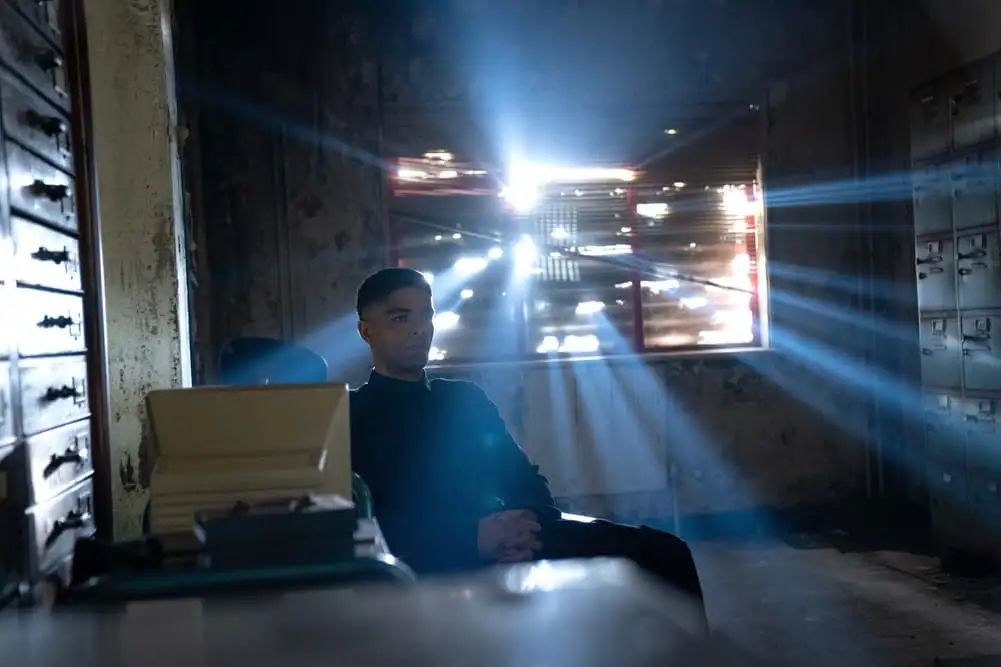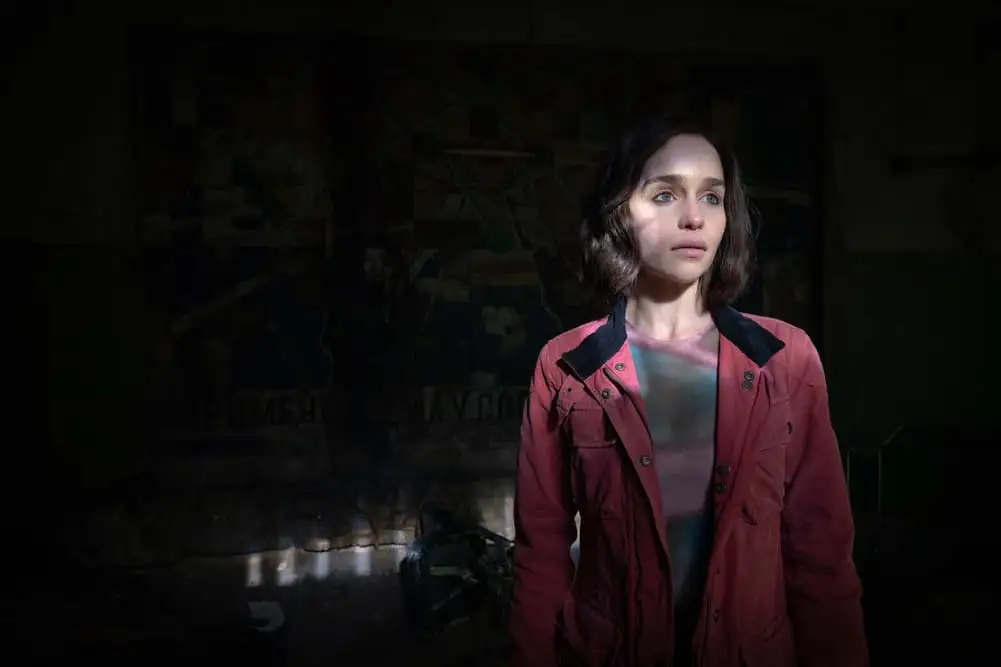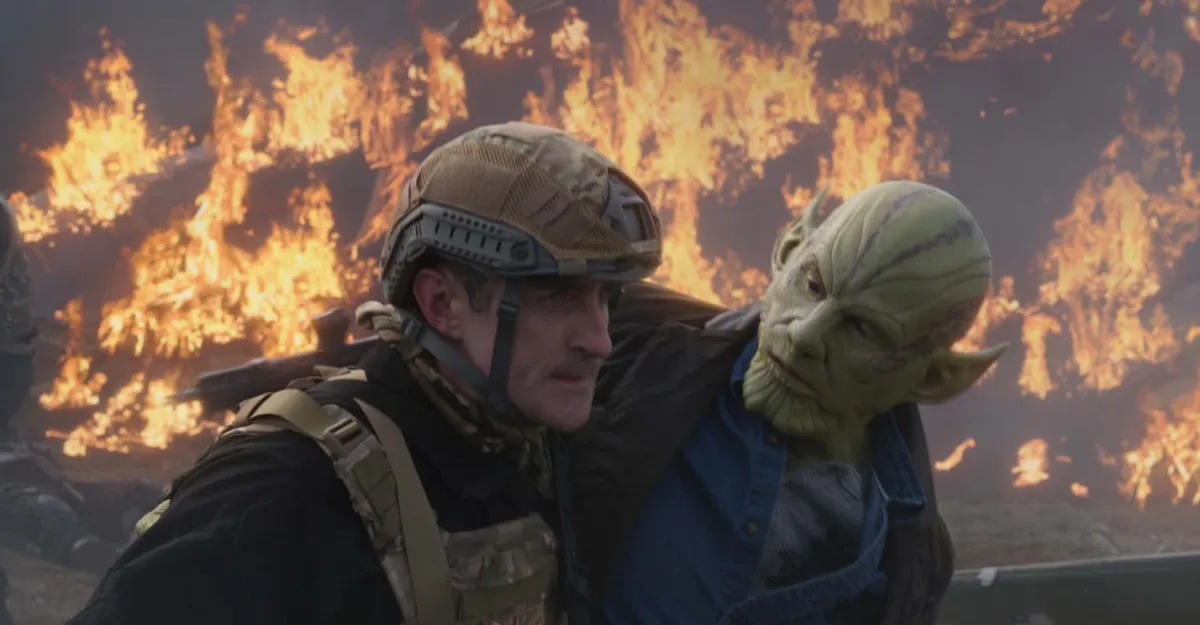This discussion and review contains only minor spoilers for Secret Invasion episode 2, “Promises” on Disney+.
Secret Invasion obviously exists in conversation with Captain Marvel. Allowing for their supporting roles in Spider-Man: Far from Home, Captain Marvel was the last project in the Marvel Cinematic Universe (the MCU) to feature Nick Fury (Samuel L. Jackson) and Talos (Ben Mendelsohn) in major roles. More than that, Secret Invasion is picking up a significant dangling story thread set up by Captain Marvel. It is a story about what happened to the Skrulls. The opening scene of “Promises” takes place in the direct aftermath of Captain Marvel.
Captain Marvel is a flawed film. It has some serious problems. It’s far from the best that the MCU has to offer. However, the film did make one very interesting tweak to established comic book mythology. It reinvented the Skrulls, the classic green-skinned shape-changing monsters from comic book lore. For decades, the Skrulls had been presented as villains and monsters, ugly invaders from a foreign world trying to take over the planet.
Captain Marvel initially played with that idea, introducing Carol Danvers (Brie Larson) as a loyal soldier of the Kree Empire, committed to hunting down and eradicating the villainous shape-shifting Skrulls. However, at around the film’s midpoint, there is a dramatic reveal. The Skrulls are not evil. In fact, they are dispossessed refugees. They are victims of persecution, desperately looking for somewhere that they might call home.
To be fair, this was hardly an unpredictable approach to the Skrulls. For decades, comic books have treated the Skrulls as convenient stand-ins for any easily vilified Other. As Paul R. Kohl has pointed out, they were introduced in the pages of Fantastic Four as “a perfect counterpart to the Communist threat Americans were alerted to by Senator Joseph McCarthy or allegorical films like 1956’s Invasion of the Body Snatchers.” They were an insidious evil that could pass as human — but ultimately weren’t.

Over time, their meaning shifted. Secret Invasion takes its title and basic concept from a 2008 crossover written by Brian Michael Bendis and illustrated by Leinil Francis Yu. This miniseries was many different things in many different contexts, but its portrayal of the Skrulls anchors it firmly in the context of the War on Terror. Secret Invasion is a product of late Bush-era paranoia, in which superheroes have been replaced by evil alien doppelgängers with a sinister plan.
As Vanessa Ossa has noted, the event miniseries tapped into “the post-9/11 paranoia of hidden infiltrators while questioning the distinction between ally and enemy.” In the words of Babu Ritesh, it recast the Skrulls as a race of “secretly religious extremists that are fully willing to suicide-bomb themselves as they utter a phrase of devotion to their God.” As comic book writer Grant Morrison put it in Supergods, “some slightly hamfisted attempts to compare Skrulls to radical Islamists were made.”
Secret Invasion was published shortly after Mark Millar and Steve McNiven’s Civil War. Taken together, these books are a fascinating cultural artifact, a snapshot of an America that was swept up in a feverish nationalist paranoia during the War on Terror. America was under constant threat, particularly from within. Enemies were hiding everywhere, and they had to be fought. Anybody could be a traitor. Nobody could be trusted.
The portrayal of the Skrulls in Captain Marvel was a reaction against the tendency to use the Skrulls as stand-ins for a racialized enemy infiltration trying to subvert national security. It was similar to the deconstruction of the Mandarin (Ben Kingsley) in Iron Man 3, using a classic comics trope to critique the systemic prejudices that it reflected. In both Captain Marvel and Iron Man 3, the villain is the culture that creates the threat of a racialized outsider to justify a military response.

As the MCU has gotten older, it has become increasingly literal-minded, often to a self-defeating extent. Shang-Chi and the Legend of the Ten Rings attempted to “fix” the portrayal of the Mandarin in Iron Man 3, by revealing the character was really an ancient Chinese warlord named Wenwu (Tony Leung). This led to the spectacularly unforced error of producer Kevin Feige having to explain to the Chinese press that Marvel Studios had not intended to make a movie with a Fu Manchu stand-in.
Just as Shang-Chi promised fans a more “comics accurate” take on the Mandarin, Secret Invasion offers a more traditional take on the Skrulls. Of course, just because something is faithful to the source material doesn’t necessarily make it good. For all its flaws, Captain Marvel understood that it probably wasn’t a good idea to construct a blockbuster narrative around a bunch of dispossessed refugees at a time when anti-immigrant sentiment was particularly strong in America.
Secret Invasion makes some clumsy gestures at other readings. In the monologue that opens the show, Agent Prescod (Richard Dormer) suggests that the Skrulls should be read as a metaphor for the era of “fake news” and “alternative facts.” He muses, “Imagine a world where information can’t be trusted. Not very hard, is it?” He continues, “Society starts to fray. All we can turn to are the people we care about. But what if those people weren’t who we thought they were?” That is an interesting update on the original premise.
However, the execution isn’t really convincing. Secret Invasion awkwardly tries to have things both ways. The Skrulls are both dispossessed refugees living in radioactive ruins in Russia and a secret cabal composed of UK Prime Minister Pamela Lawton (Anna Madeley), Commander of NATO Sergio Caspani (Giampiero Judica), and FXN talk show host Chris Stearn (Christopher McDonald). It’s Schrödinger’s Shape-Changing Cat. It also makes no rational sense in narrative terms.

If anything, this portrayal of the Skrulls recalls Umberto Eco’s observation about how fascism depicts its enemies as paradoxically “both weak and strong.” The Skrulls are simultaneously a ragtag band of survivors and the most powerful people on the planet. More unsettlingly, Secret Invasion suggests that the Skrulls who have replaced the political leaders and are subverting democratic norms are the “good ones,” in that they are the group initially standing against Gravik (Kingsley Ben-Adir) and his terrorist bombing campaign.
This sort of conspiratorial thinking was a staple of 1990s pop culture, but those were different times. As Inkoo Kang has pointed out, The X-Files was a harder sell in the era of “Fox News, terrorists, and truthiness.” Nearly one in five Americans believes the QAnon conspiracy theory. This isn’t to suggest that Secret Invasion will radicalize any of its viewers; it’s just that these sorts of stories are a lot less fun when the people who believe these things are shooting up pizza restaurants and rioting in the Capitol.
It is possible to tell these sorts of uncomfortable stories through the lens of pop culture. In terms of a science fiction parable about radicalized militant terrorism within an immigrant community of shape-changing alien refugees, Secret Invasion recalls the two-part Doctor Who episode “The Zygon Invasion” and “The Zygon Inversion.” The premise is remarkably similar to Secret Invasion, focusing on violent political acts conducted by a young radical fringe group.
However, the biggest difference between “The Zygon Invasion” and Secret Invasion is that “The Zygon Invasion” at least tries to place its political violence in context. The Zygons are persecuted and victimized. One community of settlers is radicalized when local humans murder an innocent Zygon child. Another Zygon who struggles to maintain his form (Nicholas Asbury) is targeted by a lynch mob and chooses to take his own life because it has become impossible for him to live in peace.

After all, the reality is that these immigrant communities are more likely to be victims of political violence than perpetrators. Muslim communities were targeted by hate crimes during the heightened rhetoric of the War on Terror. Asian diaspora communities have experienced similar acts of violence tied to paranoid rhetoric about the COVID pandemic. Community spaces like African American churches or Jewish synagogues are frequently targeted.
Secret Invasion makes clumsy gestures towards acknowledging that the Skrulls might have experienced some hardship and that the planet’s majority population might have some blame for that. “Humans can’t coexist with each other!” Fury tells Talos as they share a train car at the start of “Promises.” “There is not enough room or tolerance on this planet for another species.” More than that, it’s clear that Gravik and G’iah (Emilia Clarke) are motivated by the fact that Fury and Talos have failed to keep their promises.
It is something vaguely approaching a sympathetic motivation, but it is also a false equivalence. While Secret Invasion understands and accepts the Skrulls’ desire for “home in (their) own skin,” it glosses over the acts of violence that such a community would experience to radicalize its members. Like The Falcon and the Winter Soldier, Secret Invasion is a show that feels very worried that it might make its young radicals seem too sympathetic, and so it undercuts any nuance or insight.
To be clear, it is not impossible for a pulpy television show to engage with weighty and ambitious themes like the complicated realities of political violence. After all, Secret Invasion seems to position itself as Marvel’s answer to something like Andor, a series that is about what writer Tony Gilroy describes as “accelerationism.” Even Peacemaker was able to pull off a similar alien infiltration storyline by acknowledging the reactionary libertarian fantasy at its core. Secret Invasion is playing with these big weighty ideas around immigrant communities and radicalization but lacks the sophistication necessary to do them justice.
That said, the closing scene of “Promises” suggests that Secret Invasion might ultimately boil its central conflict down to a trite family soap opera focused on Nick Fury’s home life. While that’s a much less interesting and ambitious way to frame the material, perhaps it’s ultimately safer.






Published: Jun 28, 2023 10:00 am